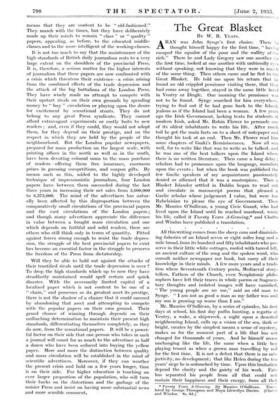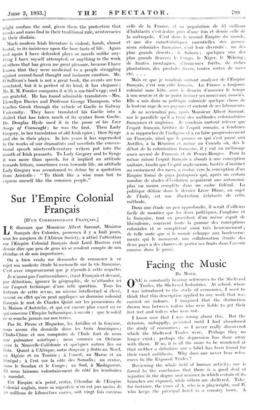The Great Blasket
By W. B. YEATS.
ARAN was John Synge's first choice. There he thought himself happy for the first time, "having escaped the squalor of the poor and the- nullity of tile rich." There he and-Lady- Gregory saw one another br the first time, looked at one another with unfriendly eyes without speaking, not knowing that they were in seareli of the same thing. Then others came and he fled to the Great Blasket. He told me upon his return that he found an old crippled pensioner visiting there, that they had come away together, stayed in the same little hotel in Ventry or Dingle. One morning the pensioner was not to be found. Synge searched for him everywhere, trying to find out if he had gone back to the Island, jealous as if the Island had been a woman.- A few years ago the Irish Government, lacking texts for students of modern Irish, asked Mr. Robin Flower to persuade one of its oldest inhabitants to write his life. After much toil he got the main facts on to a sheet Of notepaper and thought his task at an end. Then Mr. Flower read him some chapters of Garki's Reminiscences. Now all was well, for to write like that was to write as he talked, and he was one of the best talkers upon the Island where there is no written literature. Then came a long delay ; scholars had to pronounce upon the language, moralists upon the events ; but when the book was published the few Gaelic speakers of my acquaintance passionately denied or affirmed that it was a masterpiece. Then a Blasket Islander settled in Dublin began to read out and circulate in manuscript poems that pleased a Gaelic scholar whose judgement I value, but were too Rabelaisian to please the eye of Government. Then Mr. Maurice O'Sullivan, a young Civic Guard, who had lived upon the Island until he reached manhood, wrote his life, called it Twenty Years A-Grauring,* and Chatto and Windus have published a translation.
• . • • • All this writing comes from the sheep runs and diminish- ing fisheries of an Island seven or eight miles long and a mile broad, from its hundred and fifty inhabitants who pre- serve in their little white cottages, roofed with tarred felt, an ancient culture of the song and the spoken word, who consult neither newspaper nor book, but, carry all their knowledge in their minds. A few more years and a tradi- tion v'here Seventeenth Century poets, Mediaeval story- tellers, Fathers of the Church, even Neoplatonic philo- sophers have left their traces in whole poems or fragmen- tary thoughts and isolated images will have vanished. "The young people are no use," said an old man to Synge. "1 am not as good a man as my father was and my son is growing up worse than I am."
Mr. Maurice O'Sullivan, by a series of episodes, his first days at school, his first day puffin hunting, a regatta at Ventry, a wake, a shipwreck, a night upon a deserted neighbouring Island, calls up a vision of the sea, dark or bright, creates by the simplest means a sense of mystery, makes us for the moment part of a life that has not changed for thousands of years. And he himself seems unchanging like the life, the same when a little boy playing truant as when a grown man travelling by rail for the first time. It is not a defect that there is no sub- jectivity, no development; that like Helen during the ten years' siege he is untouched by time. Upon this limitation depend the clarity and the gaiety of his work. Fate has separated his people from all that could not sustain their happiness and their energy, from all that * Twenty Years A-growing. By Maurice O'Sullivan. Tran•i- lated by George Thompson and Moya Llewellyn Davies. (Chat to and Windus. 8s_ 6d.), might confuse .the .soul, given them the protection that monks and nuns find in their traditional rule, ariStocracies in their disdain.
Much modern Irish literature is violent, harsh, almost brutal, in its insistence upon the bare facts of life. Again and again I have defended plays or novels unlike any- thing I have myself attempted, or anything in the work of others that has given me great pleasure, because I have known that they were medicinal to a people struggling against second-hand thought and insincere emotion. Mr. O'Sullivan's book is not a great book, the events are too unrelated, but it is perfect of its kind, it has elegance ; Mr. E. M. Forster compares it with a sea-bird's egg; and I am grateful. He has found admirable translators—Mrs. Llewellyn Davies and Professor George Thompson, who teaches Greek through the vehicle of Gaelic in Galway University. They have translated his Gaelic into a dialect that has taken much of its syntax from Gaelic. Dr. Douglas Hyde used it in the prose of his Love Songs of Connaught; he was the first. Then Lady Gregory, in her translation of old Irish epics ; then Synge and she in their plays. In late years it has superseded in the works of our dramatists and novelists the conven- tional speech nineteenth-century writers put into the mouth of Irish peasants. To Lady Gregory and to Synge it was more than speech, for it implied an attitude towards letters, sometimes even towards- life, an attitude Lady Gregory was accustomed to define by a quotation from Aristotle : "To think like a wise man but to express oneself like the common people."





































 Previous page
Previous page